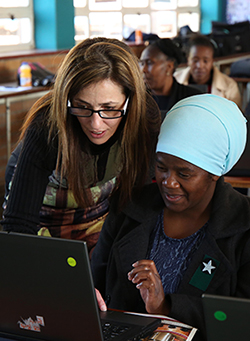Latest News Archive
Please select Category, Year, and then Month to display items
22 September 2021
|
Story Michelle Nöthling
|
Photo Supplied
 Annemarie Le Roux.
Annemarie Le Roux.
“I love working with children.” This is one of the first things Annemarie le Roux mentions when asked to describe herself. This love for children propelled Annemarie into the field of education and she graduated in 2006 with a BEd in Foundation Phase at the UFS. Annemarie immediately immersed herself in the Deaf community, enriching the lives of children at the Thiboloha School for the Deaf in Qwaqwa and the De la Bat School for the Deaf in Worcester.
The academic world enticed Annemarie back to the University of the Free State (UFS) and she was appointed as a junior lecturer in the Department of South African Sign Language (SASL) and Deaf Studies in 2013. Going from strength to strength, Annemarie completed her master’s degree in SASL in 2019, and published an
article earlier this year that she co-wrote with Marga Stander. In this article, they found that SASL “has become an increasingly popular language that hearing university students want to learn as a second language” and subsequently explored different teaching methods used for this emerging group of interested students.
Although now firmly established in academia, Annemarie is still committed to the practical application of SASL. “I am closely involved in student and community engagement through the
SIGNALS Sign Language student association that helps empower the Deaf community and South African Sign Language.” She also interprets for the Deaf community whenever she gets an opportunity, as well as for Deaf students in class and meetings.
On the importance of Sign Language and the recognition of the Deaf community in South Africa, Annemarie believes it will open greater opportunities for development. “More people will be able to learn SASL, and it might even become a subject in school for hearing children.”
Digitising the Advanced Certificate in Teaching (ACT)
2017-02-06

The 100% online ACT aims to help
teachers improve their qualifications.
More information is available at
http://www.ufs.ac.za/ACTonline.
Photo: Supplied
Online learning is fast becoming the most convenient and affordable way to study. In 2016, the South Campus of the University of the Free State (UFS) became the first university in South Africa to launch a fully online course for current teachers to upgrade their qualifications; the Advanced Certificate in Teaching (ACT).
The IDEAS Lab digitisation team on our South Campus is responsible for converting the existing ACT modules from a blended format to a 100% online format. With this format all lessons and study material are available online, with no contact sessions required. The advantages of online, interactive learning far outweigh those of blended learning. Lessons are converted to videos online, which is not only more user-friendly, but students can also access the lessons repeatedly.
In addition, tutors are always available, with WhatsApp groups and the ACT Online Facebook page further facilitating the support provided. Discussions between or communication with students situated in remote areas is made possible, adding to an enriched student experience. Immediate feedback on activities serves as a diagnostic tool as well as motivation for the students.
Lesson videos are recorded at the IDEAS Lab Studio at the South Campus or onsite at various schools. Students are expected to complete a unit, which consists of two lessons, per week.
There are “think about your learning” activities after each lesson as well as “after readings” to ensure that students have grasped the material. In these and many other ways the online ACT is specifically designed to suit students’ unique needs and make their studies a satisfying and rewarding experience.